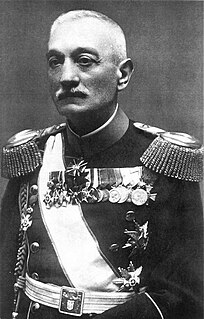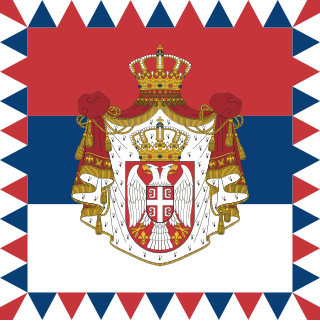
A prince regent, or prince-regent, is a prince who rules a monarchy as regent instead of a monarch, e.g., as a result of the Sovereign's incapacity or absence. While the term itself can have the generic meaning and refer to any prince who fills the role of regent, historically it has mainly been used to describe a small number of individual princes who were regents.

Saint Stefan Uroš V, known in historiography as Uroš the Weak, was the second Emperor (Tsar) of the Serbian Empire (1355–1371), and before that he was Serbian King and co-ruler with his father, Emperor Stefan Dušan.
In the United Kingdom, Counsellors of State are senior members of the British Royal Family to whom the monarch, currently Elizabeth II, delegates certain state functions and powers when not in the United Kingdom or unavailable for other reasons. Any two Counsellors of State may preside over Privy Council meetings, sign state documents, or receive the credentials of new ambassadors to the United Kingdom of Great Britain and Northern Ireland.
The Regency Acts are Acts of the Parliament of the United Kingdom passed at various times, to provide a regent in the event of the reigning monarch being incapacitated or a minor. Prior to 1937, Regency Acts were passed only when necessary to deal with a specific situation. In 1937, the Regency Act 1937 made general provision for a regent, and established the office of Counsellor of State, several of whom would act on the monarch's behalf when the monarch was temporarily absent from the realm. This Act forms the main law relating to regency in the United Kingdom today.

The Yugoslav monarchy was abolished by the then-ruling Communist regime on 29 December 1945, on the second anniversary of the Second Session of the AVNOJ.

Jovan Simonov Plamenac was a Montenegrin politician.

Prince Arsenije "Arsen" of Yugoslavia was a dynast of the House of Karađorđević and ancestor of the current cadet branch of the Royal Family which ruled Yugoslavia until 1945. He served as an officer in the Russian Army.
Jovan Branković was the titular Despot of Serbia from 1496 until his death in 1502. He held the title of despot given to him by Vladislas II of Hungary, and ruled a region known as Rascia, being equivalent of modern Vojvodina, under the Kingdom of Hungary. Despot Jovan was the last Serbian Despot of the Branković dynasty, which was regarded as legitimate successors of the "holy Nemanjić's", they continued the ktetorship to Hilandar and other sacred things to protect the nation and the religion. He was proclaimed a Saint in 1505, under the name Saint Despot Jovan.

Kosta Protić was the first Serbian General and the Chief of the Serbian General Staff.
The 100 most prominent Serbs is a book containing the biographies of the hundred most important Serbs compiled by a committee of academicians at the Serbian Academy of Sciences and Arts. The committee members were Sava Vuković, Pavle Ivić, Dragoslav Srejović, Dejan Medaković, Dragomir Vitorović, Zvonimir Kostić, Vasilije Krestić, Miroslav Pantić and Danica Petrović. The book was first published in 1993 on 20+617 pages, reprinted in 2001, and the third extended edition was printed in 2009.


















